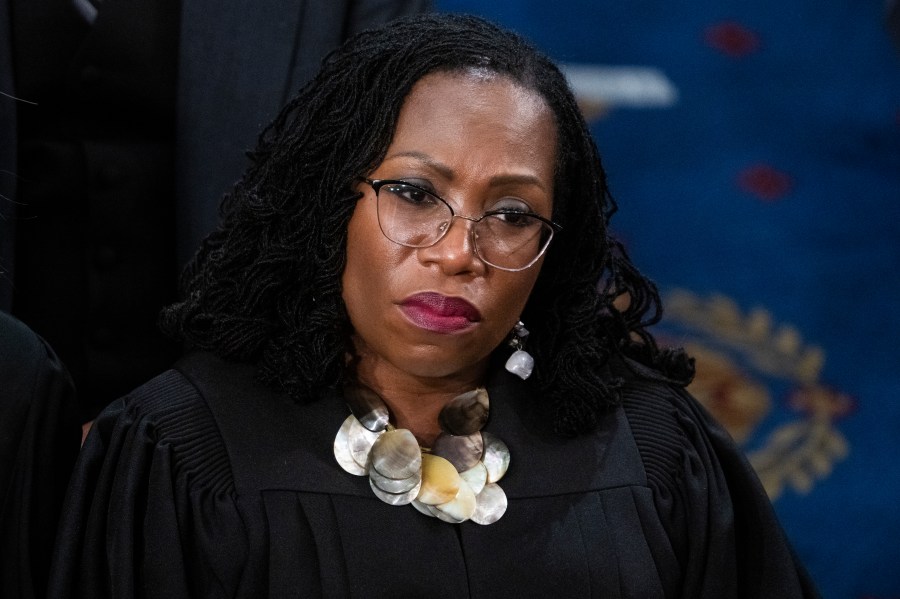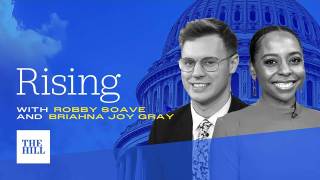Supreme Court signals reluctance to disqualify Trump from ballot
The Supreme Court on Thursday appeared reluctant to take the extraordinary step of disqualifying former President Trump from appearing on the ballot during a historic oral argument in which the justices grilled lawyers about whether states have the authority to ban a candidate from running for federal office.
The justices spent almost no time debating whether Trump engaged in insurrection through his actions surrounding the Jan. 6, 2021, Capitol attack, which various lawsuits contend requires Trump’s disqualification under the 14th Amendment.
Instead, the court during the two-hour argument largely delved into various off-ramps that would doom the various challenges without requiring the justices to reach that politically fraught question.
Several justices seemed sympathetic to Trump’s argument that states have no authority to disqualify federal candidates, while some also questioned whether the clause applies to the presidency, both findings that would preserve the former president’s eligibility nationwide.
“What’s a state doing deciding who other citizens get to vote for president?” said Justice Elena Kagan.
Top Stories from The Hill
- Senate advances Ukraine funding without border security reforms
- Ex-federal judge says Supreme Court has no ‘legitimate off-ramps’ to avoid Trump decision
- FAFSA problems pile up, leaving students and parents scrambling
- White House pits immigration deal collapse as GOP vs. Border Patrol
Chief Justice John Roberts raised concerns that, if the court disqualifies Trump, other states may move in “very quick order” to boot Democratic candidates from the ballot.
“That’s a pretty daunting consequence,” said Roberts.
The Civil War-era provision prevents individuals who served as an “officer of the United States” and then engaged in insurrection from holding federal office, unless Congress votes to lift their disqualification.
Originally designed to keep ex-Confederates from returning to power, the clause fell dormant for decades before anti-Trump voters and groups began filing dozens of lawsuits contending Trump’s actions surrounding Jan. 6 should disqualify him from seeking a second White House term.
The justices spent little time questioning whether the Jan. 6 Capitol attack was an insurrection — a key issue in earlier phases of the case — though the matter was briefly raised by Justice Ketanji Brown Jackson at the end of Trump’s argument.
“The Colorado Supreme Court concluded that the violent attempts of the petitioner’s supporters…qualified as an insurrection as defined by Section 3…what is your position?” Jackson asked.
“We never accepted or conceded in our opening brief that this was an insurrection,” Jonathan Mitchell, the lawyer representing Trump, replied. “What we said in our opening brief was President Trump did not engage in any act that can plausibly be characterized as insurrection.”
Jackson interjected: “If the point is that a chaotic effort to overthrow the government is not an insurrection —”
“But we didn’t concede that it’s an effort to overthrow the government either, Justice Jackson,” Mitchell rebutted.
“None of these criteria were met. This was a riot. It was not an insurrection. The events were shameful, criminal, violent – all of those things – but did not qualify as insurrection as that term is used in Section 3,” the Trump lawyer said.

UNITED STATES – FEBRUARY 7: Supreme Court Justice Ketanji Brown Jackson attends President Joe Bidens State of the Union address in the House Chamber of the U.S. Capitol on Tuesday, February 7, 2023. (Tom Williams/CQ-Roll Call, Inc via Getty Images)
The Supreme Court agreed to take up the weighty dispute of Trump’s disqualification after Colorado’s top court in December ruled 4-3 that Trump was ineligible for the state’s primary ballot, the first state to do so.
Four Republican and two independent voters had challenged Trump’s eligibility in the state with backing from watchdog group Citizens for Responsibility and Ethics in Washington. Maine disqualified Trump days later, while dozens of other challenges across the country failed.
Jason Murray, the plaintiffs’ attorney, portrayed Trump’s disqualification as necessary to preserve American democracy.
“We are here because for the first time since the War of 1812, our nation’s capital came under violent assault,” Murray began his argument.
“For the first time in history, the attack was incited by a sitting president of the United States to disrupt the peaceful transfer of presidential power,” he continued. “By engaging in insurrection against the Constitution, President Trump disqualified himself from public office.”
The justices’ decision is now poised to provide a national resolution to the various cases, thrusting the high court into the center of the 2024 race as they weigh in on the former president’s status nationally. Although the conservative-majority court includes three of Trump’s own appointees, the court has regularly ruled against the former president.
Until the Supreme Court reaches its decision, Trump’s name will remain on ballots, even in the two states where he was deemed disqualified.
The high court is hearing the case on an expedited timeline, meaning a decision could come within weeks, even before voters in most states prepare to head to the polls, although some states have already begun printing their ballots.
Several of the justices, both on the conservative and liberal sides of the court, raised concerns about issue a decision taking Trump off a ballot.
“Your position has the effect of disenfranchising voters to a significant degree,” Justice Brett Kavanaugh, who was nominated to the court by Trump, cautioned the plaintiffs’ attorneys at one point.
Kagan, a liberal justice, suggested that the issue of whether to keep Trump on the ballot should be decided nationally, not by a state.
“Maybe put most boldly, I think there’s a question that you have to confront is why a single state should decide who gets to be president of the United States?” she said.
The controversy is one of multiple historic disputes implicating Trump, the frontrunner for the GOP’s presidential nomination, that are barreling toward the Supreme Court.
The legal fights have appeared to solidify Trump’s standing with GOP voters. He has painted himself as the victim of politically-targeted suits, and he easily won the Iowa caucuses and New Hampshire primary in January.
By early next week, Trump is expected to appeal to the justices a ruling that he doesn’t have presidential immunity from his federal 2020 election subversion indictment, where he is not directly charged with insurrection but is charged with other federal crimes.
Two of Trump’s attorneys in that case were inside the Supreme Court for Thursday’s arguments, as was Trump senior adviser Jason Miller. Trump himself did not attend.
At one point, Kavanaugh asked if the former president could be disqualified if a federal insurrection charge if it were brought and Trump was convicted.
“Yes, but the only caveat that I would add is that our client is arguing that he has presidential immunity,” responded Mitchell.
This story was updated at 1:26 p.m.
regular post copyright









